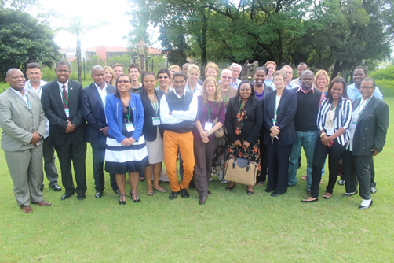The stakeholders came from research and academic institutions, non-governmental organizations, government departments, and the private sector, all seeking innovative ways to foster uptake of knowledge generated from research. Through a collaborative and interactive dialogue, the workshop created a mutual learning exercise for all participating institutions. Furthermore, it explored the potential for future partnership on research uptake activities in South Africa, and more broadly Southern Africa, and in this regard, developed a community of practice of professionals working in the areas of research impact and uptake from different angles.
The workshop introduction was given by Mr Dhesigen Naidoo; CEO WRC who spoke about the idea of uptake and the challenges that are faced when dealing with uptake. He said “there is a chasm, between science and impact. Uptake is all about showing impact and thus very few decisions are informed by scientists. We need to consider the notion of value chain in the process, we need to come up with new methodology and expand our minds around uptake process.” He further added that although a huge investment has been made towards research in South Africa, as a scientific community there is a need to show impact through uptake initiatives and to ask the big question “what impact have we made?”
Dr. Pius Chilonda, Head of IWMI Southern Africa office set the scene of the workshop by giving an overview of uptake for impact in Southern Africa. In his speech, Dr. Chilonda highlighted the notion that uptake is not a linear process and it is not only about research findings alone, but effective water research should address fundamental issues of how water affects livelihoods of people.
A number of presentations were made showcasing practical examples in which water research uptake is being implemented by various institutions. Dr. Inga Jacobs, WRC, presented WRC’s strategic approach to research uptake and the WRC knowledge tree. IWMI’s Africa research uptake strategy was presented by Mr Thor Windham-Wright from IWMI West Africa. Other practical examples on strengthening research impact were presented by the Centre for Scientific and Industrial.
The key discussion points from the workshop were as follows:
- The strategies and tools used to achieve uptake may differ but the overall objectives of working to ensure that knowledge from research is communicated, understood and acted upon by stakeholders from across the spectrum of research users to beneficiaries, are commonly shared.
- There is good potential for institutions to learn from each other’s experiences in pursuing uptake strategies and developing activities, tools and materials to nurture uptake. There is no ‘right’ way to nurture uptake but by sharing best practices, and examples of successes and challenges, organizations might be able to enhance the efficacy of their uptake efforts.
The time was rather short to conclude and share best practice as evidenced through the many discussions. As a result, stakeholders were encouraged to see the development of a community of practice on research impact and uptake in water and related domains.
